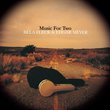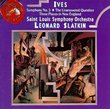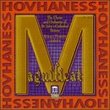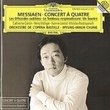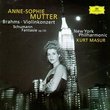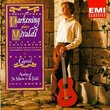| All Artists: John Tavener, Paul Goodwin, Patricia Rozario, Christopher Robson, John Harle, James Gilchrist, The Academy of Ancient Music, Oxford The Choir of New College Title: Tavener - Total Eclipse · Agraphon / Rozario · Harle · Robson · Gilchrist · AAM · Goodwin Members Wishing: 1 Total Copies: 0 Label: Harmonia Mundi Fr. Release Date: 3/13/2001 Album Type: Import Genres: Pop, Classical Styles: Vocal Pop, Opera & Classical Vocal, Chamber Music, Historical Periods, Classical (c.1770-1830) Number of Discs: 1 SwapaCD Credits: 1 UPC: 093046727123 |
Search - John Tavener, Paul Goodwin, Patricia Rozario :: Tavener - Total Eclipse · Agraphon / Rozario · Harle · Robson · Gilchrist · AAM · Goodwin
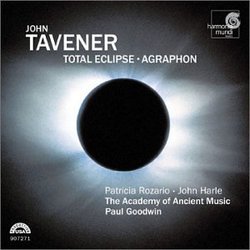 | John Tavener, Paul Goodwin, Patricia Rozario Tavener - Total Eclipse · Agraphon / Rozario · Harle · Robson · Gilchrist · AAM · Goodwin Genres: Pop, Classical
British composer John Tavener continues to realize his spiritual obsessions with his work Total Eclipse, given its world premiere recording here. This much-anticipated collaboration with Paul Goodwin and the Academy of Anc... more » |
Larger Image |
CD DetailsSynopsis
Amazon.com British composer John Tavener continues to realize his spiritual obsessions with his work Total Eclipse, given its world premiere recording here. This much-anticipated collaboration with Paul Goodwin and the Academy of Ancient Music follows Eternity's Sunrise, which was a commission by the famous Early Music ensemble to celebrate its 25th anniversary. Integral to this performance is soprano Patricia Rozario, whose experience in interpreting Tavener's "holy minimalism" has made it almost second nature for her. Total Eclipse explores both religious and musical elements, combining them to illustrate the idea of metanoia, or conversion, which is Tavener's focus here. The piece, a single movement in four parts, is structured using the conversion of St. Paul as a platform. The requested stage positioning of the instruments, voices, and choir plays a significant role in symbolizing Saul's transformation, which--while the aural-spatial landscaping is captured quite well in this recording--can only be truly experienced in a live performance (the work was premiered at St. Paul's Cathedral in June 2000). A soprano saxophone (representing Saul), at times wailing with Coltrane-esque intensity (to "be played in a deliberately anarchic manner"), at other times questioning softly, is beautifully and appropriately pitted against the period instruments of the Early Music ensemble with a near chilling effect. In addition to the sax, Tavener--outside his now familiar simple use of harmony--employs several newer compositional techniques and instrumentation: the work embraces improvisation, microtonal textures, Far Eastern percussion instruments, and an earth-shattering ensemble of 19 tympani. Also on this disc is Agraphon, a setting of the poem by the Greek poet Angelos Sikelianos. It was commissioned by the Athens Concert Hall, and also features Rozario. --W.T. Arnold Similarly Requested CDs
|
CD ReviewsYour preconceived notions will now be turned on its ear Moses Alexander | Alabama, USA | 06/01/2001 (5 out of 5 stars) ""Total Eclipse" is far far far far far away from what folks have come to expect from John Tavener. This piece is a musical interpretation of the Apostle Paul's conversion on the road to Damuscus. The opening passage is so intense, I didn't know what to make out of it the first time I heard it. Shrill, shrieking, wailing saxaphone that pierces the air with its intensity. In recent compositions, Tavener's juxtapositions of savagery and serenity are awe inspiring. The 19 timpani are enough to make one cower under their thunderousness. A lot of people will hear this not consider it sacred music, but I think in a lot of ways it is. This certainly won't be performed at a church service (or at least I hope not), but it definately has a sacred, spiritual quality in what it tries to achieve (and ultimately does achieve), a profound sense of change...or "metanoia" (denoting conversion of the heart.) As with most of Tavener's work, newcomers must display a certain amount of patience, as Tavener doesn't depend on traditional western classical convetions to create his music (he is one of the few composers that seems to have found a truly unique voice.) The drama, intensity, honesty, and sincerity of this piece make it quite moving. Parts of it move me to tears. If one adds to all this the idea that this is being performed on baroque instruments (minus the saxaphone) than this is also a great technical achievement as well!As one previous reviewer said, "Total Eclipse" and "Agraphon" are pretty much on opposite ends of the spectrum. This is a setting of a Greek poem by Angelos Sikelianos (here the poem is translated into English.) This text will probably shock or surprise many people using imagery such as "a dog's bloated carcass." Tavener's writing for Rozario's (soprano) voice is quite unusual here. The musical interludes between verses add heightened tension when set against the beauty of Rozario's voice and the bizarre but beautiful notion the poem conveys. The writing for Rozario's voice goes back and forth between one of self assured contemplation and one of quirkiness. This is one of those things that has to be heard to be believed. A triumph of modern music!" A different "shade" of John Tavener Eric McCalla | Denver, COLORADO | 04/16/2001 (5 out of 5 stars) "TOTAL ECLIPSE and AGRAPHON are two newly-recorded works John Tavener has produced in associaton with Paul Goodwin and the Academy of Ancient Music for Harmonia Mundi. If you are familiar with Tavener, then this recording will be quite the surprise upon first hearing it.I first played it on my car's system, which ordinarily is not the best acoustic for any classical music, as road noise often can interfere with quiet passages. I much prefer my living room setup with 4-channel sound and a subwoofer. In any case the first 30 seconds of TOTAL ECLIPSE nearly blew me out of the car. Not so much in a physical sense, but emotionally.The first 4 1/2 minutes feature John Harle on saxophone with a string section and some 19 timpani (per the liner notes). This is not your usual Tavener opening. Rather, it is something much more aggressive and modern. It will turn your perceptions of what Tavener's "soundscapes" usually sound like by 180 degrees. What is familiar here is his use of the *ison* or eternity note, played by the string section. Little else in the first few minutes is familiar to this long-time Tavener devotee.It is quite refreshing to find that once again, Tavener is exploding the traditional parameters that are the intersection of classical and sacred music. It is not for those looking for something *holy* like the Goudod MESSE SOLONELLE or Mozart's MASS IN C-minor. No, what it is heard is a new slate upon which Tavener is again re-writing the conventions of music.On TOTAL ECLIPSE Tavener brings forth the formidable vocal talents of James Gilchrist and Christopher Robson. The use of a countertenor heightens the otherworldy *feel* of the vocal lines, buttressed at some jarring and effective intervals by the choir, who evidently were recorded antiphonally. Their voices are meant to sound heavenly as a *responsory* to the visions of Saul as he experiences *metanoia*, or transformation throught the power that is the light from God. Quite dramatic and I'm sure most effectively experienced live and certainly not sitting in one's living room. I felt much the same way about Tavener's oratorio WE SHALL SEE HIM AS HE IS, which for me is the pinnacle of modern choral drama. AGRAPHON featuring the always-superb Patricia Rozario is a setting of a Greek poem by Angelos Sikelianos. It is a piece that is very much a counterpoint to the drama and intensity of TOTAL ECLIPSE. Firstly, it is sung in English and not with nearly as much force. It is more of a recital piece than a full-scale liturgical opera. It does display Rozario's gift for conveying the full range of human emotion through the voice, especially melancholy and despair. I think the listener is best served by NOT listening to both works consecutively. They are of two completely different motivations from the composer's hand. They stand alone rather than together. My thanks to Harmonia Mundi, the AAM, Tavener and all the artists who have brought these 2 *modern* masterpieces into the world of *modern* music." Timeless hirofantv | tomorrow | 05/20/2002 (5 out of 5 stars) "I'm glad one man has the vision to write music this impressive. Total Eclipse begins with long, muscular, screaming high notes & powerful, rolling percussion. The over-40-minute piece also has ancient contrapuntal & choral harmonies & sections of very unique melodic lines like nothing else but not in any way directionless noise. These sections & the choral are fused in such a manner as to create an optimal synergy between them. Then, the 2nd piece on the cd, Agraphon, just over half as long as Totasl Eclipse, focuses more on the vocal & choral elements. It all aspires to convey a flash of insight that resonates through eternity -- new music composed of essential elements."
|

 Track Listings (2) - Disc #1
Track Listings (2) - Disc #1